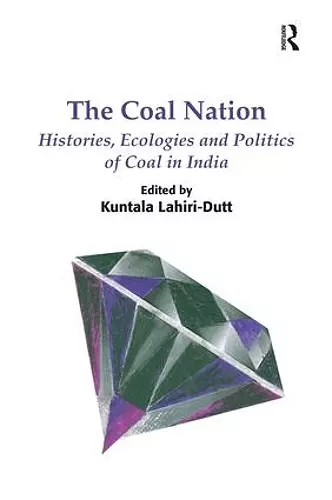The Coal Nation
Histories, Ecologies and Politics of Coal in India
Format:Hardback
Publisher:Taylor & Francis Ltd
Published:11th Apr '14
Currently unavailable, and unfortunately no date known when it will be back
This hardback is available in another edition too:
- Paperback£50.99(9781138272033)

Social science research is emerging on a range of issues around large and small-scale mining, connecting them to broader social, cultural, political, historical and economic factors rather than purely measuring the environmental impacts of mining. Within this broader context of global scholarly attention on extractive industries, this book explores two specific contexts: the cultural politics of coal and coal mining, within the context of one particular country, India, which is the third largest coal producer in the world. Both contexts are special; with its separate Ministry, coal occupies pride of place in contemporary India, shaping the energy future and influencing the economic and political milieu of the country. The supremacy attributed to coal mining in contemporary India represents how ’coal nationalism’ has replaced ’coal colonialism’ in the country, turning this commodity into an icon, a national symbol. In recent years the extraction of coal in forest-covered resource peripheries has dispossessed and pauperised many tribal and rural communities who have used these resource-rich lands for their livelihoods for generations. The combustion of coal to produce electricity constitutes the compelling need, and the factor that prevents the Indian state from fully engaging with the impending realities of a climate-changed future. All these reasons make the timing of this book of crucial importance. In particular, The Coal Nation explores the complex history of coal in India; from its colonial legacies to contemporary cultural and social impacts of mining; land ownership and moral resource rights; protective legislation for coal as well as for the indigenous and local communities; the question of legality, illegitimacy and illicit mining and of social justice. Presenting cutting-edge multidisciplinary social science research on coal and mining in India, The Coal Nation initiates a productive dialogue amongst academics and between them and activists.
’Combining the insights of social history, political economy and political ecology, The Coal Nation is able to expose not only the contested and often violent history of India’s exploitation of coal, but also charts the larger contours of India’s colonial and post-colonial development. A vibrant and wide-ranging collection of pathbreaking contributions to our understanding of how coal came, and continues, to energize India.’ Michael Watts, University of California, Berkeley, USA ’Civilisation as we know it is grounded in the dirty labour practices of dirty fossil carbon. But this fact is as unfamiliar to most students of civilisation as it is to students of development and economy. In this important multidisciplinary book, Lahiri-Dutt’s team has prospected Indian coal to expose rich seams. A significant achievement requiring global attention.’ Barbara Harriss-White, Emeritus Professor, Oxford University, UK ’The great strength of this book is its breadth. Drawing on history, geography, economics, engineering and policy studies it demonstrates the value of interdisciplinary co-operation. This approach provides a unique understanding of an industry that played a critical role in Indian history and will grow in importance with the doubling of production that is predicted for the next decade. Alive to the industry's potential for expanding socio-economic development, the book explores problems of safety, dispossession, ownership, ecological degradation and climate change. The chapters provide specialist knowledge of different periods, places and problems, yet converse with each other to offer an integrated picture of the industry as a whole. In so-doing it poses pertinent questions for policy makers and for public discussion.’ Peter Alexander, University of Johannesburg, South Africa
ISBN: 9781472424709
Dimensions: unknown
Weight: 771g
348 pages